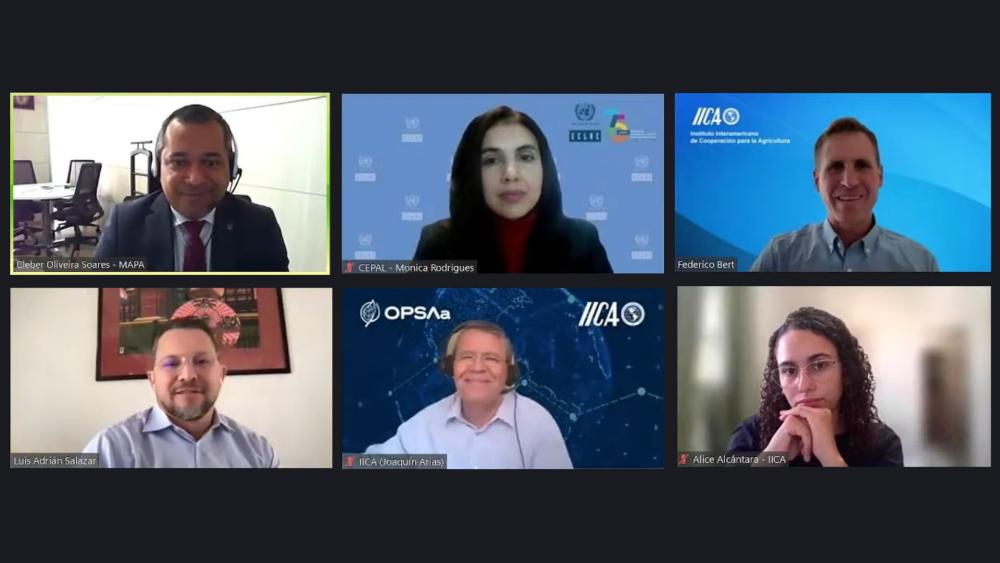Agricultural digitalization in the Americas is underway and public policies must ensure that it advances without leaving anyone behind, say experts at a seminar organized by IICA

San Jose, 16 May 2024 (IICA) - Countries of the Americas are already advancing in the digital transformation of agriculture and more public policies are necessary to ensure that the process is carried out in a fair and equitable manner, without leaving anyone behind. This was stated by experts from different nations in a webinar organized by the Inter-American Institute for Cooperation on Agriculture (IICA).
The activity was part of the so-called Pre-Week of Digital Agriculture, which is carried out in preparation for Digital Agriculture Week (DAW) 2024, which IICA will organize together with its strategic partners –CAF, ECLAC and CIMMYT- from September 23 to 27.
The Public Policies for Agricultural Digitalization webinar was an opportunity to present the results of programs and actions aimed at promoting digitalization and discuss the development and adoption of technologies. In this sense, the participants warned that the advance of agricultural digitalization should not reproduce inequalities in income and access to public goods to the detriment of the most disadvantaged sectors.
The Pre-Week includes a series of activities, leading up to the third edition of DAW, which will take place at IICA headquarters, in San Jose, Costa Rica, in late September. This is an initiative of the Institute within the framework of its Hemispheric Program on the Digitalization of Agrifood Systems, which aims to promote the dynamic and inclusive digitalization of agrifood systems of the Americas.
Digitalization is a top priority issue on IICA's technical cooperation agenda, since it is the most transformative process that the different stakeholders of agrifood systems will face in the coming years.
A group of 15 startups from the continent, which will be selected by a Jury, will have the opportunity to participate in person at the DAW, with all expenses paid. The choice will be made based on the potential of these digital solutions to improve the production, sustainability and inclusion of agrifood systems. Those interested can find the conditions of the contest and apply, until July 1, on the website www.semanaad.iica.int.
Although it is not an exclusive condition, the application of ventures led by women will be considered with special interest. Those who are not selected to travel will be able to participate virtually and will be part of the IICA AgTechs Network.
International leaders, public and private multinational organizations and high-level officials from the ministries of Agriculture will also be present at DAW 2024.
Multiple stakeholders
Digitalization is a complex process that involves multiple stakeholders, which is why the formulation of public policies is essential, explained Federico Bert, Manager of IICA’s Digitalization of Agrifood Systems Program, when justifying the need to survey what is being done in different countries to learn and support the design of policies with greater impact.
Cleber Oliveira Soares, Assistant Deputy Minister at the Ministry of Agriculture and Livestock of Brazil, gave a detailed presentation on the path that the digitalization process of agriculture in Brazil is taking. “The first and most important thing is to have infrastructure, which means connectivity, and Brazil has made progress in recent times, because just a few years ago only 23% of farms had some level of connectivity”, he explained.
“It is clear and evident that we are not in an optimal situation, but we are improving and the situation is under control”, added Oliveira Soares.
Monica Rodrigues, from the Agricultural Development Unit of ECLAC, considered that, in the face of the challenges that affect agriculture in the region, the digital issue is crucial and not all the potential benefits are being reaped.
“What we see is that the advance of digitalization is happening spontaneously. This means that it is happening, regardless of whether we make the policies to make it happen in the correct way or not. The problem with spontaneity is that the process tends to reproduce access gaps that exist in other areas”.
The specialist said that within the agricultural sector, territorial and farm size gaps are reproduced. Thus -she stated- public policies must ensure that the digitalization process does not reproduce these gaps and opens the door to more inclusive and resilient agrifood systems.
Luis Adrián Salazar, professor at the University of Costa Rica and former Minister of Science, Technology and Communications of this country, pointed out that the agricultural digitalization process has to focus on youth.
“It is essential to enhance digital capabilities so that young people who help their parents in rural tasks see a way to develop their productive models with the collaboration of technology. Sometimes there is a perception that technology is destined for big cities, but this is not the case. It is a key tool to retain youth in the countryside”, Salazar said.
In turn, Joaquín Arias, specialist in Agricultural Sector Policies and Analysis at IICA, reviewed the information that is available in the Institute's Public Policy Observatory for Agrifood Systems (OPSAa), on topics such as public investment in the area of digitalization, records of plans and projects, public policy frameworks and rural connectivity.
Finally, Alice Alcantara presented the mapping of policy initiatives identified in different countries to promote agrifood digitalization, carried out by IICA’s Digitalization of Agrifood Systems Program. She pointed out that the majority of public policy projects are quite recent, which reflects an incipient interest and revealed that there are multiple initiatives promoted by the private sector, individually or organized, which underscores the need for public-private collaboration in such a complex topic.
More information:
Institutional Communication Division.
comunicacion.institucional@iica.int